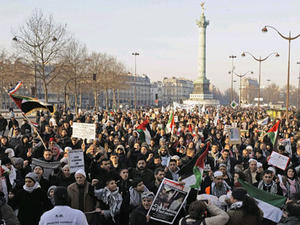CounterterrorismME turmoil offers both problems and hope for U.S. counterterrorism efforts
In a few short weeks, popular uprisings in the Islamic world have upended counterterrorism relationships that the United States spent much of the past decade trying to build; the turmoil is a source of concern for U.S. counterterrorism officials, scrambling partnerships that have been critical to operations against al Qaeda; U.S. officials say, though, that the long-term prospect of democratic reform in the region will likely be a setback to the terrorist group, because the uprisings — and the prospect that more democratic and representative governments could emerge — will do significant damage to al Qaeda’s appeal

Diplomatic world has been turned on its head // Source: rfi.fr
In a span of weeks, popular uprisings in the Islamic world have upended counterterrorism relationships that the United States spent much of the past decade trying to build.
The turmoil has emerged as a source of concern for U.S. counterterrorism officials, scrambling partnerships that have been critical to operations against al Qaeda, even though the long-term prospect of democratic reform in the region is seen as a potential setback to the terrorist group. The Washington Post reports that the popular revolts have led to the ouster of a stalwart counterterrorism ally in Egypt, and threatened an autocrat who has allowed the United States to use drones and special operations troops to hunt al Qaeda operatives in Yemen.
Seemingly stable monarchies such as those in Saudi Arabia and Jordan are being forced to sharpen the focus of their intelligence and security services on internal unrest. Even one of the main U.S. adversaries in the region, Libya’s Moammar Gaddafi, distrusted al Qaeda and occasionally provided intelligence to the CIA.
“Change is scary — we’re going to have to create or re-create relationships with these countries,” a senior U.S. counterterrorism official told the Post. “There’s certainly reason to be concerned.”
The turbulence extends beyond the Middle East and North Africa. U.S. officials have struggled to repair new ruptures in the relationship between the CIA and its counterpart in Pakistan. The agency was forced to remove its top spy from Islamabad in December, and is scrambling to free another employee from prison after he fatally shot two Pakistani men in Lahore.
“On the counterterrorism front, this has been a bad winter,” said Bruce Riedel, a former CIA official and adviser to the Obama administration. “That doesn’t detract from the fact that al-Qaeda has had a bad winter, too.”
U.S. officials cited particular apprehension about developments in Yemen, which has served as a sanctuary for al Qaeda’s most potent affiliate, al Qaeda in the Arabian Peninsula, or AQAP.
Yemeni president Ali Abdullah Saleh has allowed an expanded CIA and U.S. military presence in his country over the past eighteen months, as well as U.S. missile strikes on suspected AQAP targets.
Since last summer, Saleh has also allowed the U.S. Joint Special Operations Command to patrol his country with armed Predator drones. All of the operations are contingent on the U.S. relationship with Saleh, who is now under mounting internal pressure to end his 32-year rule.
“Whatever focus we’ve maintained on al Qaeda in the
